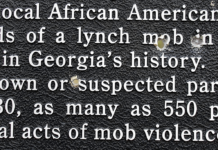If the goal is a democratic debate about how public institutions like public schools should work for families and communities, then leading progressive voices need a fact-based come-to-your-deity about the fact that some of their assumed constituencies, black folks and people of color, disagree with the union-aligned top-down agenda prevalent in liberal politics.
Last week, Robert Kuttner from The American Prospect wrote a hot and bothered piece ripping the New York Times for writing a sympathetic story about the parent group that protested a speech by Elizabeth Warren on a recent campaign stop.
He complained that “The Times ran an overwrought and overwritten front-page story Wednesday under the breathless headline, ‘Minority Voters Feel Betrayed Over Schools.’”
I appreciate the NYT story because it treated Black parents who choose charter schools as people with practical aims, valid lived-experience, the confidence of agency, and demonstrable intelligence. That’s a departure from how they are usually cast. That so many white progressives labeled these parents as something close to slaves for white people says more about progressives than the parents.
For his part, Kuttner says Times journalists Erica Green and Eliza Shapiro overstated nonwhite support for charter schools and buried an important fact deep in their story.
He says:
…if you read all the way to paragraph 38 (!), you will learn that according to a poll by Education Next, a journal that supports charters, black opinion on charter schools is in fact evenly divided, 47 percent supportive to 47 percent opposed.
While Kuttner accuses Green and Shapiro of quoting “fervent charter school supporters” and using “unsupported generalizations” to manufacture decisive support among Blacks, he erred by claiming support “is in fact evenly divided.”
That’s inaccurate.
The Ed Next poll he quotes shows Black respondents support charters more than any group except Republicans, and the group most opposed are public school teachers in unions.
See:

After public and private prodding Kuttner published a sorry-not-sorry correction this week.
“I owe our readers a much deeper look at the charter school controversy, as well as error-free reading of polls. Both will be forthcoming,” he chafed, then foreshadowed what might be his next line of attack on the Times story: ”polling results vary widely depending on the wording and framing of the question, the sponsor of the poll, and the context.”
This is, unfortunately true. It is possible to make data and surveys say whatever advocates what them to say.
For example, Kuttner may be talking about polls like the one conducted by Brilliant Corners for RolandMartin.com. Their results showed remarkably high levels of Black support for charters and choice (in addition to increased school funding).
This is where judgment is essential. For me, that poll asked what looks like the cleanest version of a charter school question I’ve seen: “Generally speaking from what you know, do you favor or oppose public charter schools?”
That question – free from contrasts or push polling about presumed negative impacts by charters on traditional schools – yields 72% Black favorability and just 13% opposition.
As you might expect, an even higher percentage (97%) of African-American charter school parents favor charters.
Another useful angle Brilliant Corners took was to put the narratives of reformers and opponents of reform to the test.
Respondents were given two statements to rate as most agreeable:

That match up of opposing ideas results in unambiguous support on the charter side.
See:

Kuttner would likely be unmoved by Brilliant Corners, especially given their poll was done for Roland Martin, who is known to support charters.
Instead, Kuttner shifts attention to a poll more to his liking, one done by the Public Policy Institute of California that he says “reverses the finding of the Education Next poll cited by the Times.”
In that poll, Black support in California for charters is an eyebrow-raising low of 36%, well below white support at 50%.
Here is a snapshot of those results:

While interesting, it’s unclear why Kuttner thinks Black opinion in California trumps Black opinion nationally.
It’s important to note that Black concern about charters taking money from traditional district schools is profound, especially in California cities like Los Angeles, where teachers’ unions have conducted long and expensive campaigns to exploit Black fears for political purposes. Connecting charter schools to long-standing fiscal incompetence and flat funding in traditional school districts like L.A. and Oakland is persuasive and worth the investment of unions who know that families leaving for charters reduce their dues-paying ranks.
I wonder if Kuttner missed bad news his argument, and, ironically, support for some significant claims made by reformers?
For example, African-American respondents in the PPI poll also were far more likely to rate the quality of their local public schools poorly. They were more likely to say schools are doing a poor job of preparing students for college or work, and they were more likely to say teacher quality is a significant problem.
In his haste to claim Black opinion is on his side, Kuttner leaves the most crucial response from Black respondents unaddressed:
…most Californians (75%) and public school parents (81%) say it is very or somewhat important for parents in lower-income areas to have the choice of sending their children to charter schools instead of traditional local public schools. African Americans (52%) are the most likely to say this is very important.
However ambivalent Blacks are about charters in California (the state Kuttner strategically uses to make his point) African Americans believe parents in poor communities should be the ones who choose whether or not charters are worthy for their needs. Other subgroups agree.
Kuttner’s quarrel isn’t with the Times as much as it is with facts and Black people.
Seeing this, I think Kuttner’s argument grows more desperate, the more he writes. At one point, he complains that one of the polls cited by the Times uses the phrase “public charter schools.” He seethes: “charter schools are public only in their taxpayer funding; their actual accountability to public systems varies widely. Many are for-profit, or nominally nonprofit but managed by for-profit management companies.”
In fact, whether or not charter schools are public can most decisively be determined by a simple reading of how charters are defined by the state laws that create them.
In California, the state Kuttner wants us to focus on, the state defines charter schools as follows:
A charter school is a public school that may provide instruction in any combination of grades (kindergarten through grade twelve). Parents, teachers, or community members may initiate a charter petition, which is typically presented to and approved by a local school district governing board. The law grants chartering authority to county boards of education and the State Board of Education under certain circumstances, such as the appeal of a petition’s denial by a school district governing board or the direct approval of countywide benefit or statewide benefit charter schools.
If the goal is a democratic debate about how our shared institutions like public schools should work for families and communities, then leading progressive voices should reconcile their positions with their assumed constituencies. Black folks and people of color disagree with the union-aligned top-down agenda that dominates liberal politics.
The fact is, Kuttner is representative of the dominant culture in progressive “thinking” circles. Like Diane Ravitch, he represents a long list of white paloeliberals, higher education ideologues, unionists, PTA moms, hipster journalists, college-educated middle-class neosocialists Tweeting from suburban basements, and a vast system of pressure groups.
They can’t keep prioritizing an education system that they bubble wrap in starry-eyed nostalgia without coming cleaning about how that system has harmed some groups for generations.
If progressives want to live up to their declared values of equity, social justice, and equal opportunity, then they can’t continue erasing pro-charter school families as if they don’t matter.
The clearest example of what people of color think about charters is evidenced by how many of them choose a charter school when given the opportunity.










